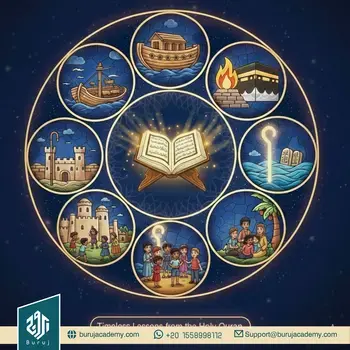Have you ever listened to a beautiful Quran recitation and felt captivated by its rhythm and flow? It’s not just the melody; it’s the precise way the reciter pauses and continues, creating a powerful and meaningful experience. This art of stopping and starting lies at the heart of Tajweed, known as the Rules of Waqf and Ibtida. For Arabic learners who want to connect more deeply with the Quran, mastering these rules is an essential and transformative step.
The Quran is a divine text, and every word, every phrase, carries profound meaning. When you recite it, you become a vessel for this sacred message. However, misinterpreting a verse through an incorrect pause can completely change its meaning.
Contact Us For More Details
For example, consider the statement: “There is no god except Allah.” If you pause at “There is no god” (لا إله), you unintentionally alter the central belief of Islam. This simple yet powerful illustration shows why learning the Rules of Waqf and Ibtida is so critical.
What Are Waqf and Ibtida?
Let’s start with the basics. In Arabic, Waqf (وقف) literally means “to stop.” In the context of Quranic recitation, it refers to the intentional act of pausing the sound at the end of a word for a brief moment, typically to take a breath, with the goal of continuing the recitation. It’s a temporary stop, not a final conclusion. You pause to ensure you convey the right meaning and maintain a smooth, beautiful recitation.
Ibtida (ابتداء), on the other hand, means “to start anew” or “to begin.” After you make a Waqf, you must know where to begin again. Ibtida is about resuming your recitation from a point that makes sense linguistically and religiously. Your goal is to start at a place that preserves the integrity of the message, without creating a new, unintended meaning. Together, Waqf and Ibtida form a crucial partnership, guiding the reciter through the Quran’s complex structure and preserving its sacred intent.
The Purpose and Importance of Learning Waqf and Ibtida Rules
Learning the rules of Waqf and Ibtida gives you a deeper connection to the Quran. First and foremost, you protect the Quran’s meaning from corruption. You ensure that your recitation aligns with the divine revelation. Incorrect stops can lead to serious misinterpretations. As a result, you avoid unintentional grammatical or theological errors.
Furthermore, mastering these rules improves your recitation quality. You achieve a more fluent and rhythmic flow. It helps you manage your breath, especially when you encounter long verses. Instead of struggling to read an entire verse in one breath, you can make an appropriate pause, take a moment to breathe, and continue without breaking the meaning. This not only makes your recitation sound better but also makes it physically easier.
Finally, proper pausing and starting promotes Tadabbur (تدبر), which means deep contemplation and reflection. When you pause at the right moments, you give yourself and your listeners a chance to absorb and reflect on the words. You truly internalize the message, allowing it to have a more profound effect on your heart and mind. This process transforms your recitation from a mechanical exercise into a spiritual journey.
Understanding the Signs of Waqf
You will notice various symbols in the Quran (Mushaf) that guide you on where to pause. These symbols serve as road signs for the reciter, showing you a safe and meaningful path. Understanding them is your first step to mastering Waqf.
1. Mīm (مـ):
This is the sign of Waqf Lāzim (الوقف اللازم), the compulsory or mandatory stop. When you see this symbol, you must stop. Continuing will likely corrupt the meaning. After you stop, you must begin with the next word.
2. Lā (لا):
The opposite of Mīm, this symbol indicates a prohibited stop (Waqf Mamnūʿ – الوقف الممنوع). You should not stop here. Stopping at this point can significantly alter the meaning of the verse. If you accidentally stop because you run out of breath, you must go back to a point where you can start the sentence over and maintain the correct meaning.
3. Jīm (ج):
This sign marks a permissible stop (Waqf Jāʾiz – الوقف الجائز). It gives you a choice; you can either stop or continue. Stopping is neither better nor worse than continuing. The meaning is complete at this point, but it still connects to the next part of the verse.
4. Qāf and Lām and Yāʾ (قلى):
This symbol means that stopping is better (Waqf Awla – الوقف أولى). The words that follow relate to what came before, but it’s more beneficial to make a pause for a complete understanding.
5. Ṣād and Lām and Yāʾ (صلى):
This symbol indicates that continuing is better (Waqf Muʿānaqah – الوقف المُعَانَقَة), although stopping is also permissible. The meaning here is not as complete as with Qāf and Lām and Yāʾ (قلى), so it’s best to keep reciting.
6. The Three Dots (∴):
This symbol is a conditional stop (Waqf al-Muʿānaqah – وقف المعانقة). It appears in two places close to each other. You can choose to stop at one of the spots, but you cannot stop at both. You have to pick one or continue without stopping at all.
Read Also: Rules of Meem Saakin
The Rules of Ibtida: Knowing Where to Start
As you know, after a Waqf, you must perform an Ibtida. This is a crucial skill because an incorrect start can be just as damaging as an incorrect stop. We classify Ibtida into two main types:
1. Good Ibtida (Ibtida Ḥasan):
This is a permissible start. You begin at a point that creates a new, complete sentence, and it doesn’t change the meaning. For instance, if you stop at the end of a verse, you can perform a good Ibtida by starting with the next verse.
2. Ugly Ibtida (Ibtida Qabīḥ):
You must avoid this type of start. It occurs when you begin from a place that creates a broken or misleading meaning. A classic example is starting with a word that makes a statement of disbelief, like starting with “Allah has a son” (اتَّخَذَ اللَّهُ وَلَدًا) instead of reciting the full phrase “They say that Allah has a son” (وَقَالُوا اتَّخَذَ اللَّهُ وَلَدًا). You should never begin with an Ibtida that contradicts the message of the Quran or the core beliefs of Islam.
Applying Waqf and Ibtida Rules: From Theory to Practice
Understanding the symbols and definitions is one thing, but applying them is a different challenge. The most effective way to master the rules of Waqf and Ibtida is through dedicated practice with an experienced teacher. They can guide you through the verses, correct your mistakes, and explain the nuances of each stop and start in context.
At Buruj Academy, we understand the importance of this practical application. Our tutors are not only fluent in Arabic but also have extensive knowledge of Tajweed and the Quran. They provide personalized one-on-one sessions, helping you internalize these rules so they become second nature. You learn to connect the grammatical structure of the Arabic language with the divine meaning of the Quran, truly elevating your recitation.
You can learn more about how we help you on your learning journey by exploring our Tajweed courses page and meeting our dedicated tutors.
The Connection Between Language and Faith
The relationship between the Arabic language and the Islamic faith is inseparable, particularly in the Quran. The linguistic structure of the Quran is a miracle in itself, and the rules of Waqf and Ibtida are a testament to this intricate design. These rules demonstrate how a simple pause can carry profound weight, preserving the integrity of a divine message for generations. By learning them, you are not just improving your recitation; you are gaining a deeper appreciation for the literary and theological richness of the Quran.
This journey requires patience and perseverance. You will find yourself making mistakes, but each correction brings you closer to your goal. As you progress, you will start to notice the flow of the verses, the way a topic begins and ends, and the powerful impact of a well-timed pause. Your recitation will no longer be about just reading words; it will become a conversation with your Creator.
So, if you feel ready to take your Quranic recitation to the next level, start with a solid foundation in Waqf and Ibtida. It will not only improve your fluency and understanding but also deepen your faith.
For more insights and updates, follow us on social media:
We look forward to helping you unlock the true beauty of the Quran.



